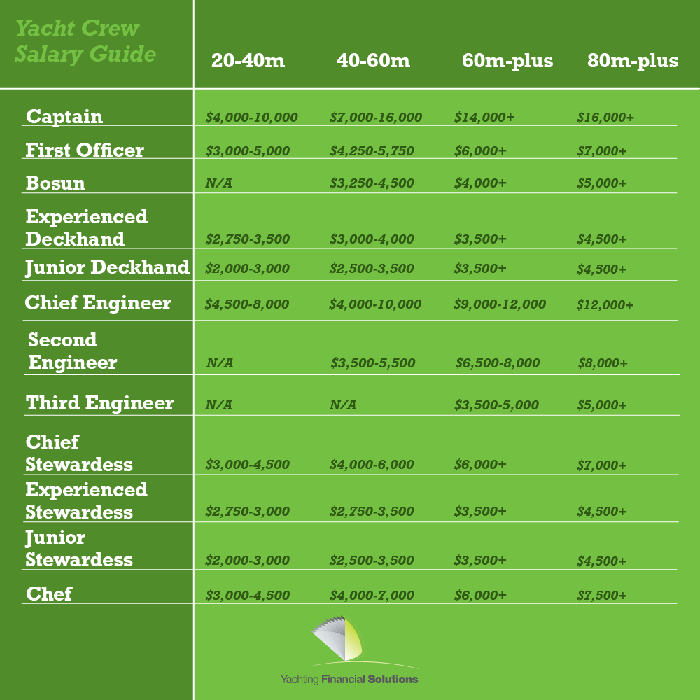What Determines a Superyacht Captain’s Salary?
It’s common knowledge that yacht crew are paid well, especially at senior officer and captain level. But how much is a superyacht captain’s salary? A study of yacht captain’s salaries reflected that this is a bit like asking, “How long is a piece of string?” And the answer depends on both tangible and intangible issues.
One of the key aspects of a salary is the responsibility that goes with it. So let’s begin there.
The role of a superyacht captain is very demanding, particularly on boats with 12 crew or more. Superyacht captains not only have to manage a boat and its crew, but also run the equivalent of a five-star hotel for the owner/guests. They need to liaise with the guests (either the owner of the boat or charterers) and translate their requests into things that can actually be achieved on board a superyacht. And while they’re doing all of that, they have to ensure the safety of the passengers and keep crew stress at manageable levels. In addition, they are the main point of contact for the boat owner or management company. The demands on a yacht captain’s time never stop and they come from all directions at once. Their salaries per month depending to a degree on how efficiently they execute all this.
Being a superyacht captain is comparable to being at director or c-suite level in a company. In fact, were you to view the superyacht as a standalone company, the captain would be the CEO. However, superyachts don’t operate entirely in isolation. They are part of the owner’s wider set up, so it is perhaps more fitting to see captains at director level. And that fits with the salaries on offer, which fall within the band you’d expect to find at director level within an SME.
Qualities that determine salaries paid to superyacht captains
But responsibilities are only one side of the coin. On the other side are the tangible qualities that you bring to the job. These will also determine how much pay you get as a superyacht captain. Think of things like:
- Your experience of similar boats and your tickets. Superyachts are extremely expensive, so owners and management companies are going to be keen to get someone with a proven track record on the bridge of a boat of equivalent size, number of crew members and/or complexity.
- Length of time in the industry. The more years you have under your belt, the higher the pay you can ask for—to a certain point. Owners are cost-conscious creatures (they aren’t super-wealthy for nothing) and will eventually start looking elsewhere if they feel you are becoming too expensive. While the position of captain may feel secure, it isn’t.
- Do you have marine experience outside yachting? Naval or commercial experience is something owners value and can be reflected in yacht captain salaries.
- Are you being hired by the management company or directly by the owner? Owners may pay you more, if only because a management company is taking part of its fee off the top of any crew budget and onboard expenses. Also, management companies are likely to have a relatively inflexible salary structure. Owners might be more inclined to pay you well above the existing pay structure on board—if there even is one.
- Do you have other relevant experience, like engineering skills and qualifications? Whether this is important depends on the size of the yacht. It’s usually more relevant on smaller boats, where individual crew responsibilities may be more wide ranging.
- Is it a rotational position? A permanent, full time position will attract a higher salary for a superyacht captain. You might find that owners like to see the same face at the helm of their yacht, which could mean more money. On the other hand, management companies running charter yachts may be more likely to rotate officers and crew, depending on their needs.
- How big is the boat? The size of the vessel is important. The bigger the boat, generally the bigger the pay cheque. The same goes for how unique or complex the boat is.
Then there are the intangibles that determine a superyacht captain’s salary.
- Shared values/interests. If you’re being interviewed by the boat owner, what qualities and interests are attractive to them? Are you the same nationality? Are you both interested in marine research? Do you support the same football team? (In fact, do you support the team the yacht owner actually owns?) Etc. etc.
- Owners intent. Is your employer looking for the best candidate for the role or are they mainly looking to cut costs?
- Captains’ length of service. Does the boat have a reputation for keeping captains long term?
- Crew length of service. Are there many long-term crew on board? What’s the turnover of crew like? What does morale feel like on board?
Why did the previous captain leave? And how sudden was their departure? The owner or management company may be desperate to fill a hole in the senior crew roster quickly, but have plans to fill the role with someone else at a later date. Never assume you are the permanent appointment. But if the boat needs to be ready for the Mediterranean season within weeks for example, you may be able to push for more money, if you sense they really need you.
Yacht Crew Salary Guide
The salaries listed here are indications based on our experience of the superyacht industry. They may not reflect your actual salary.
All in all, your salary as a superyacht captain will be anywhere between Eur/USD 50,000 and Eur/USD 300,000. On top of that, you could also receive tips.
Money is only one part of crew salaries. In addition, the number of paid holidays per year is an important consideration, along with how extensive the health cover is offered by the owner or management company.
All in all, this sounds great doesn’t it? But what are the downsides? Being a superyacht captain is a big, big ask. In addition to the regular pressures you’d expect to accompany a c-suite level position, superyacht captains have to deal with several other challenges that are almost unique to yachting.
- The job can be very lonely, and high pressured. There aren’t many people on board you can talk to freely. And in some instances, there will be things you can’t talk to anyone on board about.
- Job insecurity. You are at the whim of the boat owner. They could decide to fire you at any time and for reasons completely beyond your control.
- As a captain you are vulnerable. Many others would like your job. And if you do lose your job, you could find it difficult to find another. There are more available captains than well- paying captain’s positions.
- Family. You are away from home a lot. This can take a toll on family life, especially if you have children. It can be difficult to play a meaningful role in their daily lives if you are on the boat half or nearly all the time.
- Many boat owners are elderly. It’s a harsh fact that they could die or lose interest in yachting, resulting in the sale of the boat and possibly the end of your career.
With all of this in mind, you’d be wise to make the most of the upsides of working in yachting. You are a captain with a prestigious job on board a luxury boat—and a salary to match.
However, always keep in mind that no one remains a captain forever. It’s vital that you use your time in this position to build your financial independence as quickly as possible. Once you achieve that, you’ll be in control of your life, not your employer. We’ve written elsewhere that at least a million dollars will be needed to achieve this. Though as a captain, you have the ability to build significantly more wealth. Click here: The Unique Financial Opportunity of Superyacht Crew.
That doesn’t mean you have to stop working. But it does mean you’ll have the financial freedom to leave the boat with dignity at any time and move on to living your life on your own terms when you are ready to do so.
We have been helping captains and senior crew achieve this for over twenty-five years. We may be able to work with you too. Why not get in touch to find out more?








